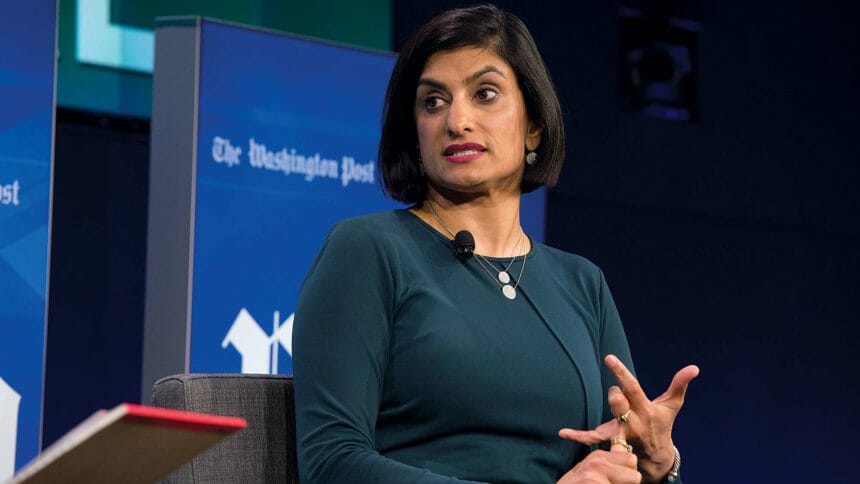
The Medicaid block grant program announced Thursday by the Centers for Medicare & Medicaid Services won’t directly affect elderly and disabled beneficiaries, CMS Administrative Seema Verma said, but it will help address a “looming cost crisis,” caused by the aging of the population, that threatens the overall sustainability of the healthcare program for low-income individuals.
Medicaid, Verma said in a morning press conference, is “already the nation’s largest payer of long-term care, and as the nation’s baby boomers age, costs for those individuals are expected to rise 500 percent by 2050. This looming cost crisis threatens the viability of the program.”
CMS formally announced the Healthy Adult Opportunity demonstration initiative Thursday. It is meant for beneficiaries aged fewer than 65 years who obtained coverage under Affordable Care Act-related Medicaid expansion in some states.
“Low-income adults, children, pregnant women, elderly adults and people eligible on the basis of disability will not be directly affected except from the improvements that result from states reinvesting savings to improve Medicaid for everyone,” Verma said.
Advocates for senior housing and skilled nursing providers and those they serve told McKnight’s Senior Living Thursday, however, that they are concerned that resources for long-term care will be limited by the plan, which Verma outlined in a 56-page letter to state Medicaid directors.
Under the program, states will be able to apply to receive federal Medicaid funding for the target population of beneficiaries on a per-enrollee basis or as a lump sum amount meant to cover all expenses, the CMS administrator said. Participating states would be required to continue to cover people whose incomes equal up to 138% of the poverty level, but they could limit benefits beyond minimum requirements, she said. In exchange for agreeing to accept a block grant, a state would be provided “a full array of flexibilities,” according to CMS, including the ability to waive requirements such as retroactive coverage periods and the ability to “engage beneficiaries through nominal premiums and cost-sharing.”
The federal agency is introducing the program at a time when Medicaid is the first or second largest budget item for states, Verma said.
“Since 2014, Medicaid has added approximately 15 million new working-age adult enrollees who primarily qualify as part of Obamacare’s expansion of the program. The program was not originally designed for this group,” she said. “Spending growth rates in this population are forecast to be higher than in others, and our most recent round of audits demonstrated that many states’ practices for verifying eligibility are far too lax. We shouldn’t have to tell someone with a disability to get on a wait list for services because we are diverting precious resources to cover someone who potentially doesn’t qualify.”
‘We have concerns’
Leaders of organizations representing senior housing and skilled nursing providers said they will work with government officials and others to try to ensure that care and services for older adults are not affected by the change. But they are worried.
“We have concerns that it could limit state resources for long-term care,” Argentum President and CEO James Balda told McKnight’s Senior Living. “However, we know policymakers will need to grapple with the retirement security crisis and the increasing need for long-term services and supports as our population ages. We will continue to work with the administration and policymakers on this and other proposals as they are refined in the coming months.”
Mike Cheek, senior vice president of reimbursement policy at the American Health Care Association / National Center for Assisted Living, said the organization is reviewing the block grant letter.
“While the new initiative announced today does not appear to be directed at long-term care services, this is an important issue because most people who reside in nursing centers rely on Medicaid, as well as tens of thousands of seniors in America’s assisted living communities,” he said. “We will continue to work with our members, CMS and other stakeholders to ensure that we can provide the quality care on which our nation’s most vulnerable residents rely.”
Approximately 16.5% of assisted living residents rely on Medicaid to pay for their daily services, according to NCAL.
LeadingAge President and CEO Katie Smith Sloan countered Verma’s suggestion that block grants will help secure the financial future of the Medicaid program.
“Inadequate funding already plagues providers of long-term services and supports, who depend upon Medicaid as the primary payer for most costs of care,” she said. “As it is, LeadingAge members must fight for every penny from state coffers allocated to cover the costs of providing vital long-term services and support to older adults and people with disabilities. This new type of waiver would only make it harder.”
Additionally, Sloan said she was skeptical of the CMS administration’s assertion that elderly Medicaid beneficiaries would see “improvements that result from states reinvesting savings to improve Medicaid for everyone.”
“It is very unlikely that block grant waivers would result in significant funds available for reinvestment in Medicaid,” she said. “In fact, the purpose of block grants is to reduce spending on the Medicaid program, often to reallocate state dollars to other programs and policy areas.”
For more industry reaction to the plan, see this article.



